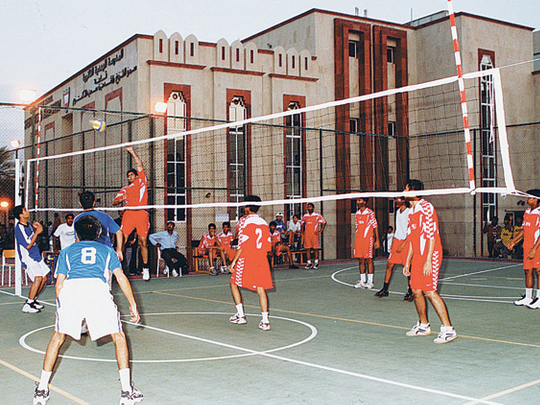
Dubai: Home by night, classroom by day — that's the way this school began functioning in a small one-room Bur Dubai apartment in 1957 when Hemkala Ben, an enterprising Indian woman who lived in the flat, ran classes in Gujarati for the children of some goldsmiths.
It was a time when few expatriates lived in Dubai, fewer still with their families. The UAE as we know it today did not exist. Neither did basic utilities like electricity or water. Yet the classes — Bharat Vidyalaya — thrived, paving the way for the UAE's first full-fledged expatriate educational institution in 1961.
Matter of pride
Recalling the early days of the institution — the Indian High School (IHS) — which marked its golden jubilee year this week, Maghanmal J. Pancholia, its founder chairman, said: "It's a proud moment for us."
A pioneering businessman who came to Dubai in 1942, Pancholia, who was also President of the Indian Association, took it upon himself to run the school with just 10 students.
"The monthly tuition fee at that time was Rs10 (Dh0.80). We used to pay Rs100 (Dh8) to the teachers," Pancholia said, adding that this amount was increased to Rs200 (Dh16) when the school brought in a trained teacher, Shantha Ben G. Kikla, from Bahrain.
He said other early teachers included Rose Varkey, educationist and mother of Sunny Varkey, who later established the well-known educational group Global Education Management Systems (GEMS).
Another teacher, Saku Mankani, went on to set up the Regent School in Dubai. Vasu Shroff, a prominent businessman who has also served as chairman of IHS, said he was the school's first teacher. "I was an honorary teacher and took lessons in Hindi and physical education," he said.
IHS, which used to be housed in Bur Dubai's Al Shirawi building and later in Al Fardan building, moved to its present premises when Pancholia prevailed upon Shaikh Rashid Bin Saeed Al Maktoum, the then Ruler of Dubai, to grant land in 1968. He said Shaikh Rashid had offered him land on three occasions, but it was not until now that he was able to mobilise funds for the building.
Pancholia said it had grown with the UAE, through its independence and rapid transformation. Having played a key role in bringing electricity to Dubai, he said admissions to the school began to grow gradually as basic utilities developed. By 1968, IHS had 300 students, he said, adding that it's a matter of great achievement that the strength of the school is now around 10,000.
Innovative approaches
"You can feel your impact," said Abdullah Al Karam, Director-General, Knowledge and Human Development Authority (KHDA), referring to the school's innovative approaches at the golden jubilee gathering.
He said it is no coincidence that the school has been the first to adopt the international CBSE curriculum worldwide, besides impacting the lives of "thousands of needy children in Africa" through Dubai Cares.
In the past two years the school has invested Dh5 million in upgrading its ICT facilities, with a Dh80 million campus coming up in Dubai Silicon Oasis. New facilities include a library, laboratories, an indoor sports complex and a business school.
A total of 225 SMART classrooms have also been set up.
Sanjay Verma, Consul General of India, said, "The Indian High School along with the India Club is like a glue that holds the Indian community together."












